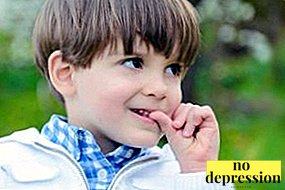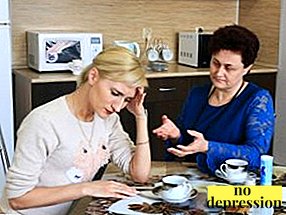There is a huge amount widespread habits, the presence of which may indicate certain mental health problems.
One of these habits is onychophagia: an obsessive desire to nibble at the nails (and sometimes the skin around the nail plate), until blood appears.
“A child bites his nails: what to do?” - this question is regularly asked by parents to child psychologists and psychotherapists, since it is in childhood that onychophagy is the most common.
What is oniophagy?

Onychophagy should be considered not just a bad habita mental disorder because she has the code in the ICD.
She often accompanies many mental illnesses, such as:
- neurosis;
- depression;
- anxiety disorder;
- obsessive compulsive disorder;
- phobic disorder.
Children who regularly face stressful situations or experience increased mental, physical or psychological stress tend to bite their nails.
Onychophagy is most commonly seen in children. from four to six to fifteen years. 35% of school-age children bite their nails. Among adults, there are also quite a lot of oniophages.
Hazards of onychophagy:
- Baby's nails look unaesthetic, can be deformed (the nail plate is capable of changing the shape, grooves, bumps appear on its surface).
- If nibbling affects the skin around the fingers, bleeding, patches of inflammation may occur. At the same time, pain does not stop some onychophagous children: they can continue to bite the skin and nails, which leads to the appearance of permanent inflammatory foci. If at the same time the child has extremely weakened immune protection (for example, it happens after long courses of antibiotic therapy, during and after chemotherapy, radiation therapy, leukemia, HIV infection - but only if the level of white blood cells is insufficient), wounds can get infected, fester, until the development of serious purulent lesions. Wound infection may occur in relatively healthy children, but the likelihood is much lower.

Onychophagy may indicate the presence of much more serious mental illnessto pay attention to.
However, many parents do not attach importance to the fact that the child bites his nails, or decide that the best way to "cure" is to give a good deal of hands.
Such an attitude to the problem leads only to a significant aggravation of the child's mental well-being.
In children 3-4 years old and older with oniophagy The following symptoms may occur:
- loss or loss of appetite;
- various sleep disorders (insomnia, uneven, excessively sensitive sleep, periodic awakenings, daytime sleepiness);
- irritability;
- nervous tics;
- depression
- loss or reduction of interest in activities that were previously important;
- deterioration in performance;
- problems with attention, concentration;
- diffidence.

This is a mental disorder. may be aggravated during severe stress, after psycho-emotional upheaval.
For example, a child may begin to bite his fingernails more often and more strongly during exam periods, during the divorce of parents, after the death of a loved one.
Why do children bite or pick their nails?
What does it mean? The main causes of onychophagy:
- The presence of internal anxiety. The child, feeling anxiety that arises for various reasons, seeks to cope with it, and onychophagy allows it to be partially done. The main reasons for anxiety are: insecurity, phobias, a feeling of helplessness, low self-esteem, internal stress due to non-compliance with the requirements put forward by others. At the same time, onychophagy is far from always perceived by the child entirely consciously.
- Autoaggressive tendencies. Autoagression - a definition that means deliberate violent actions towards yourself. Synonyms: selfharm, self-harm. Nibbling nails and the skin around them is considered one of the many forms of selharma, along with cuts, burns, and hair pulling. However, not every nail nibbling can be attributed to autoaggression. But if a child gnaws his fingers very often and to the blood, and there are other unusual injuries on his body (for example, an abundance of minor scratches), this can be interpreted as an auto-aggression.
Self-harm can be done in order to punish oneself, and sometimes in order to relieve tension, since painful sensations trigger the production of adrenaline and mental pain temporarily decreases. Autoagression is more characteristic of adolescents.
- Wrong approach of parents to education. If parents impose excessive responsibility on the child, demand unconditional obedience from him, punish not even for misconduct, but for the fact that the child did not live up to expectations, the risk of onychophagy and many other neurotic habits grows many times.
This is due to the fact that the child constantly feels mental stress and is afraid to do something not well enough.
- Family problems. Children who grow up in toxic families, more often than other children have different neurotic habits and mental illness. Toxic include families in which one or both parents resort to various types of violence against children (psychological, physical, sexual), ignore the needs of the child. Also risk factors are the following circumstances: loss of work, divorce of parents, lack of financial resources, social problems, regular scandals in the family.
- Problems in other micro societies. Mental disorders are common in rogue children: those children who are victims of school bullying. Bulling can be not only school. It often occurs in circles, sections. But even children who are not bullied can feel mental stress. For example, this may occur if school teachers behave inadequately with children, or if a child has quarreled with a school friend, or if he has not found friends and feels lonely.
- Too high loads. Responsibility increases as the child matures. The most acute is the period when the child first comes to school and tries to cope with the burden of expectations and responsibility that fell on him. It was at this time that many children have various neurotic habits that are difficult to cope with. At risk are children who attend a large number of extra classes.
- Copying habits. If someone close to the child suffers from onychophagy (parents, friends), he can adopt this habit.


Children with a history of any organic brain damage (hypoxia, traumatic brain injury, severe complications of infectious diseases) are more likely to suffer from various mental disorders.
What to do?
Key recommendations:
- Do not ignore the problem. Onychophagy may indicate a multitude of mental health problems that need to be addressed as soon as possible, because otherwise they will begin to progress. Temporarily close your eyes to the fact of nail nibbling is possible only in one case: if the child nibbles them infrequently and if nothing bad happens in his life unambiguously. In this case, if the problem continues to persist, it is necessary to take action.
- Chat with your child. You should not reward his neurotic habit with a negative assessment, otherwise he may start to get even more nervous and bite his nails more often. Do not say phrases like “Because of this, your nails will be ugly,” “Stop doing it,” because they will not lead to anything and will only upset the child, especially since he cannot just pick up and stop biting his nails.
Better in a relaxed atmosphere, ask him about the school, about his environment, about the teachers, ask if anything is bothering him.
- Look at the behavior of the child. You may be able to notice other symptoms of mental disorders. For example, a child could have deteriorated appetite, sleep, phobias, unreasonable changes in behavior (irritability, aggressiveness, isolation, and so on) could appear. The sharp drop in performance also should not be overlooked.
- Take the child to a child psychologist or psychotherapist. The specialist will talk with him and be able to identify the reasons that led to the obsessive desire to bite his nails. He will also give valuable recommendations (for example, reduce mental load, transfer the child to another school) and, if necessary, advise you to contact a pediatrician and other specialists. Some psychotherapists who have the right to prescribe medications may prescribe them. Usually prescribed mild sedatives (valerian tablets, Novo-Passit, and others).


The habit of gnawing nails is important to perceive as a symptom of the child's mental problems, and not as something independent, arising solely because of his desire.
Once the mental health of the child will return to normal, it will become much easier to cope with an unpleasant habit (it can also disappear on its own).
How to wean from a bad habit?
As mentioned earlier, the habit of nibbling nails in many cases is consequence of mental problems baby This is a side symptom, and not at all an independent “bad habit.”
Tips for dealing with the psychologist directly from the habit:
- Teach your child to care for their nails, give them a set to care for them, explain how to use these or other tools. This is especially true for girls. They can give a safe nail polish: in some cases - but not all - the presence of a beautiful and tasteless coating eliminates the desire to bite your nails. Before buying a varnish it is useful to consult a pediatrician. A good option would be caring varnishes that will help restore the nail plate.
- If you see that the child is going or has already started to bite his nails, distract him. Give him an assignment, offer to do something interesting together, start a conversation. It is desirable that all your actions, requests and words provoke positive emotions in him.
- Make sure your child has more opportunity to do interesting things. Give presents, offer books, films, educational games (and not only educational ones). If the child learns to release tension in other ways, he may stop nibbling his nails.

Parents are important to give the child as much as possible positive emotions. Body contact is very useful: hugs, kisses, strokes.
It is useful to create some pleasant ritual for example, hugging or kissing a child before bedtime.
But, if the child's mental problems are too serious, the above tips may not work: either he will have new neurotic habits instead of the former, or nothing will change.
What not to do:
- ignore the problem;
- beat the hands of a child;
- use violence, offend verbally because of habit;
- punish;
- mock;
- overly emphasize the habit in any way, especially in the negative.

If independent attempts to cope with the child’s mental problems have come to naught, you need to come to the reception to a child psychotherapist.
With a visit to a psychotherapist, it is better not to delay it, if, in addition to the habit of nail biting, there are other symptoms of mental disorders and if the child bites his nails often to blood.
How to quickly wean a child to bite nails? Psychologist tips:



